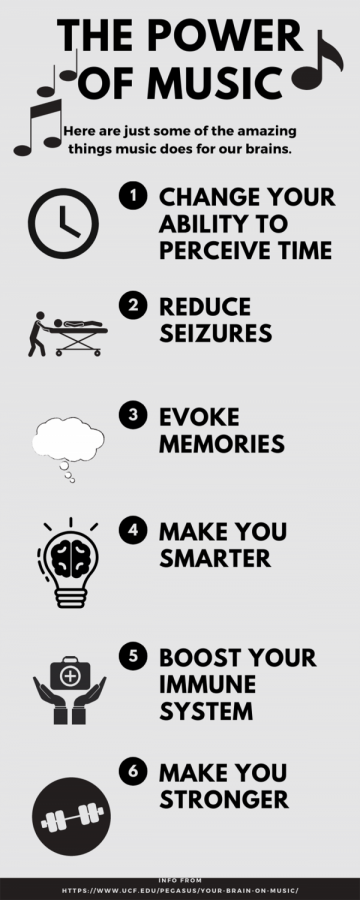Your Brain On Music
November 14, 2019
Music; everyone has their own taste and each genre sounds different. There’s relaxing jazz to hardcore metal. Some people listen to different songs based on their moods, but the songs themselves can affect your mind and mood.
With music being played nearly everywhere, it has shown to affect what you think, how you feel, and even our lives. Cafés have shown to play lighter, more relaxed music to appeal to the customers, encouraging them to stay longer. Elevator music, known as Muzak, is commonly heard when passing from floor to floor in buildings. In 1922, the original purpose of Muzak was to calm the passengers who had never tried an elevator before. As shown above, music has been used throughout history to bring people into the mood best suited for their environment.
Music is more impactful than most people think. The University of Central Florida states music can “[help] cognitive and motor skills, better [communication], [boosted] immune system, make you smarter…” Even patients with Alzheimer’s and Parkinson’s disease have shown positive reactions to music. UCF professors Kiminobu Sugaya and Ayako Yonetani performed a study, in which they saw the effects of music on different Alzheimer’s patients. Sugaya said, “Once you put in the headphones that play [their favorite] music, their eyes light up. They start moving and sometimes singing.” As shown here, music has the capacity to move even the people with impaired brain activity.
Music can affect your state of mind, being used for some therapy classes. The World Health Organization states, “Mental disorders affect one in every four people.” These numbers not only call for awareness of mental health issues, but also a recognition of the music you are listening to and the effects it can have on your life.
Our lives are commonly formed by the occurrences happening around us, without music being an exception.



